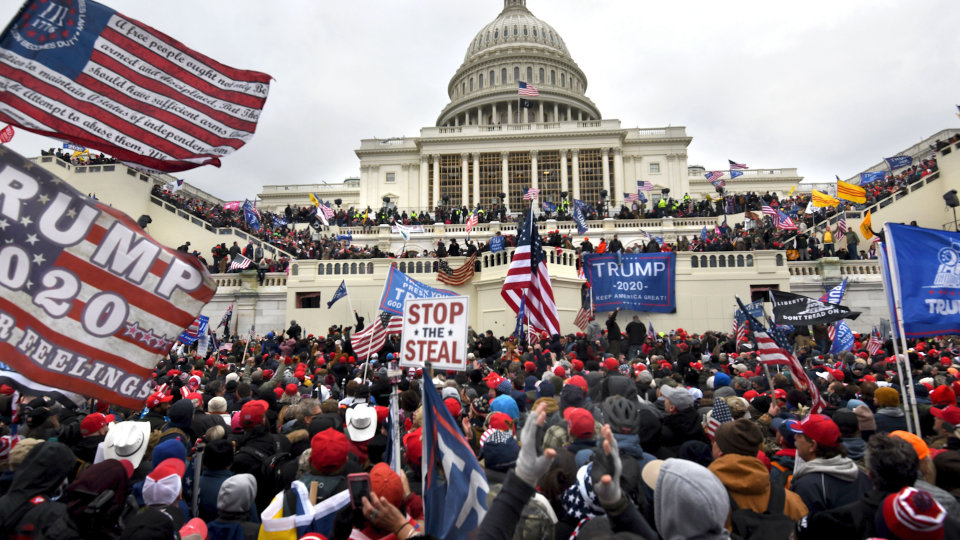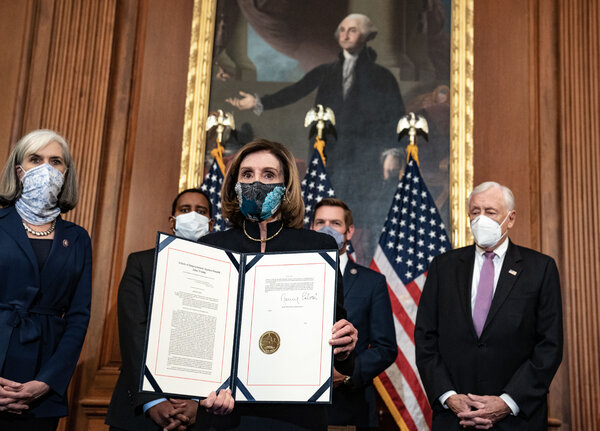On Wednesday, January 6, the Capitol, the United States, and democracy as a whole were attacked. Thousands of supporters of former President Donald Trump P’00 marched towards Capitol Hill, smashing windows, climbing barricades, and pilfering furniture in an attempt to delegitimize one of the most celebrated democratic processes in U.S. history: the presidential election. Five Americans died from the attack. Throughout all of this, the former president sat in the Oval Office, eyes glued to the television screen, watching democracy crumble. And yet Trump did nothing to stop the violence, disregarding his obligation to this country.

On January 6, 2021, insurrectionists attacked the U.S. Capitol hoping to overturn Trump’s defeat in the 2020 presidential election. As the Confederate flag breached the Capitol for the first time in history, millions feared for the future of the American democratic process. Photo courtesy of the Wall Street Journal
The insurrection and ensuing events raise many questions.
First, how was this event different from the Black Lives Matter (B.L.M.) protests that occurred this past summer? Many GOP officials have compared the Capitol riots to the B.L.M. protests; however, there are two fundamental differences. For one, the B.L.M. protests were mostly peaceful gatherings that raised awareness about police brutality against Black people. The Capitol insurrection was driven by right-wing Trump supporters and the reactionary terrorist group QAnon with hopes of blocking the certification of the U.S. presidential election. While the first movement aimed to strengthen U.S. democracy, the latter imperiled it.
The second difference is the presence of law enforcement during these two events. The B.L.M. protests were crowded with Washington, D.C., and Capitol police and the National Guard, armed to the teeth and in uniform, ready to jump in at the smallest hint of unrest. President Trump himself called in forces to clear out B.L.M. protesters using tear gas and rubber bullets. Why? So he could walk from the White House to a local church, where he brandished a Bible and took a photograph. During the Capitol insurrection, we saw a wholly unprepared U.S. Capitol police force unable to repel rioters. Trump initially refused to call in the National Guard.
Last summer, law enforcement was more than ready to attack peaceful protesters, but on January 6, they took their time to control a crowd of white supremacists attacking the Capitol. This disparity shows a marked difference in how the government treats people of color speaking out against discrimination and oppression than it does people fighting for Trump to stay in office despite his evident electoral loss.
The next question is: Should Trump be blamed for the insurrection? Yes. Just hours before members of QAnon invaded the Capitol, Trump spoke at the “March to Save America” rally. At the end of his long, rambling speech, he said, “We are going to walk down Pennsylvania Avenue … and we are going to the Capitol, and we are going to try and give … them [Republicans] the kind of pride and boldness that they need to take back our country.”
Trump has long been using his social media accounts and campaign events to spread false propaganda. Most recently, he’s brainwashed his supporters into denying the results of the U.S. presidential election, precipitating the violence we saw on January 6.
Trump’s prominent role in the insurrection raises a new question: Should he be penalized? The House seems to think so. On Wednesday, January 13, members voted to impeach Trump for the second time. Now, the trial goes to the Senate. In order for Trump to be convicted, there must be a supermajority in the Senate — 67 votes.
The GOP’s main argument against Trump’s impeachment is that he is no longer in office, so it’s not worth the effort and disruption as President Joe Biden transitions to power. Although Trump is no longer president, there are long-term benefits to impeaching him. For one, if he’s convicted, Trump loses the ability to run for a second term. In addition, he would be cut off from his yearly pension, travel allowance, and lifetime Secret Service detail. With all these things on the line, it is completely worth trying to convict him.
More important, convicting Trump sets the precedent that the leader of our country cannot incite his followers to commit acts of domestic terrorism without repercussions. No person is above the law.

On January 13, 2021, former President Trump became the only president in American history to be impeached twice. His charge? “Incitement of insurrection.” Photo courtesy of the New York Times




